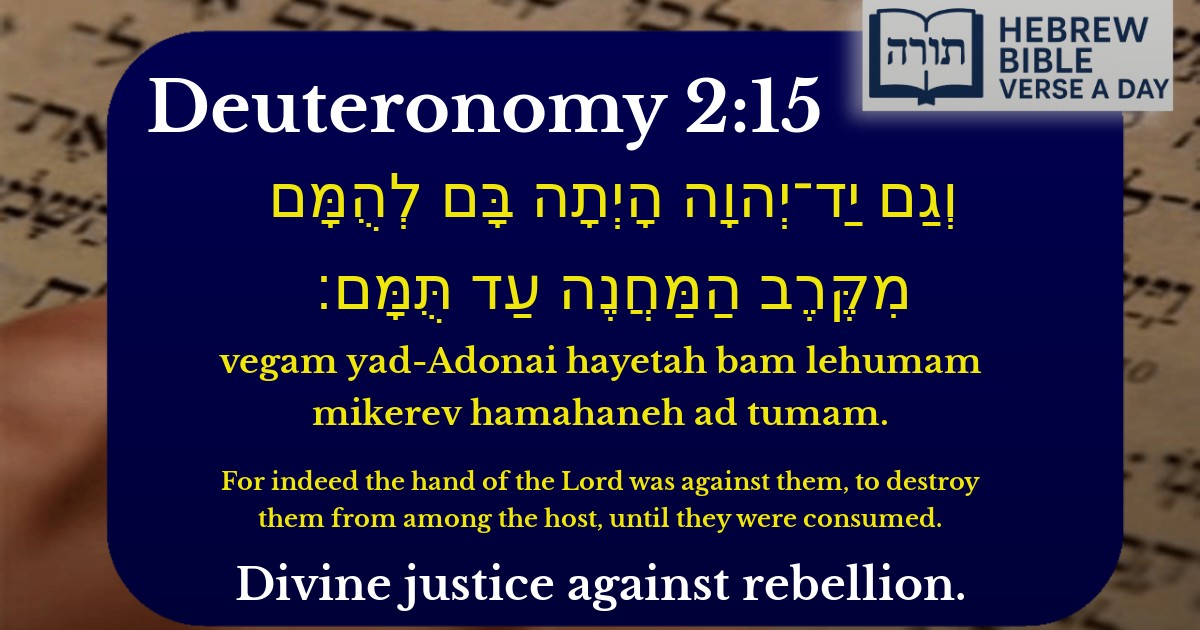Frequently Asked Questions
Q: What does 'the hand of the Lord was against them' mean in Deuteronomy 2:15?
A: The phrase 'the hand of the Lord was against them' refers to divine punishment. According to Rashi, this verse describes how Hashem punished the generation of Israelites who complained and rebelled in the wilderness, ensuring they would not enter the Land of Israel. It signifies divine justice for their lack of faith.
Q: Why were the Israelites punished in Deuteronomy 2:15?
A: The Israelites were punished because of their repeated sins in the wilderness, including the sin of the spies (Numbers 13-14), where they rejected the Land of Israel out of fear. The Midrash explains that their lack of trust in Hashem and constant complaints led to this decree that they would perish in the desert.
Q: What lesson can we learn from Deuteronomy 2:15?
A: This verse teaches the importance of faith and gratitude. The Rambam (Maimonides) explains that trust in Hashem is a fundamental principle—when the Israelites failed in this, they suffered consequences. We learn to appreciate divine guidance and avoid rebellion or ingratitude.
Q: How does Deuteronomy 2:15 apply to us today?
A: The verse reminds us that actions have consequences, especially in our relationship with Hashem. The Talmud (Sotah 35a) connects this to the idea that speaking negatively (like the spies did) can bring harm. Today, we must strengthen our faith and avoid destructive speech or attitudes.
Q: Who was being punished in Deuteronomy 2:15?
A: The verse refers to the generation of Israelites who left Egypt but, due to their sins (particularly the sin of the spies), were destined to die in the wilderness. Rashi clarifies that only those above age 20 at the time of the spies' incident were affected, while the next generation entered the Land of Israel.


Context and Source
The verse appears in Devarim (Deuteronomy) 2:15, describing the divine punishment against the generation of Israelites who rebelled in the wilderness. The phrase "וְגַם יַד־יְהוָה הָיְתָה בָּם" ("For indeed the hand of the Lord was against them") emphasizes Hashem's direct intervention in punishing those who sinned.
Rashi's Explanation
Rashi (Devarim 2:15) explains that this refers to the decree against the generation of the spies, who were condemned to perish in the wilderness due to their lack of faith in entering Eretz Yisrael. The phrase "לְהֻמָּם מִקֶּרֶב הַמַּחֲנֶה" ("to destroy them from among the host") indicates that they were gradually removed from the camp through natural and supernatural means until the entire rebellious generation perished.
Rambam's Perspective
Rambam (Maimonides), in Moreh Nevuchim (Guide for the Perplexed), discusses divine justice and explains that this punishment was a direct consequence of their rejection of Hashem's promise. Their lack of faith (emunah) warranted their exclusion from entering the Land, demonstrating that divine justice operates with precision.
Midrashic Insights
The Midrash Tanchuma (Chukat 7) elaborates that the phrase "עַד תֻּמָּם" ("until they were consumed") teaches that not a single member of that generation survived—highlighting the severity of their sin. The Midrash compares their fate to that of the Egyptians during the Exodus, where divine retribution was complete.
Talmudic Interpretation
The Talmud (Sotah 35a) connects this verse to the sin of the spies, emphasizing that their punishment was measure-for-measure (middah k'neged middah). Just as they slandered the Land, they were denied entry into it. The phrase "יַד־יְהוָה" ("the hand of the Lord") signifies a deliberate act of divine justice rather than a natural occurrence.
Key Lessons